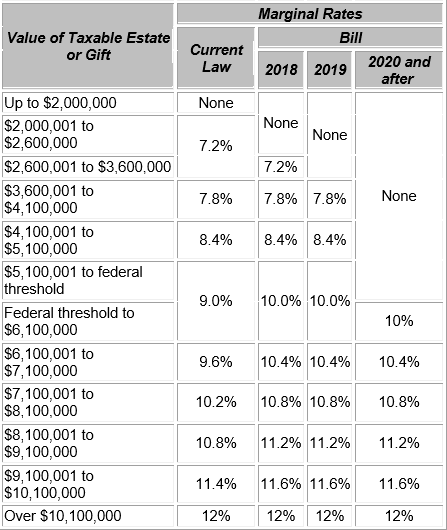THIS ARTICLE HAS BEEN SUPERCEDED BY: Update on the Connecticut Estate Tax Exemption
The new Connecticut state budget, signed by Governor Malloy on October 31, 2017, increased the individual exemption for Connecticut estate and gift taxes over the next three years. In 2017, the exemption in Connecticut was $2,000,000. Under the new law, the exemption increased to $2,600,000 in 2018 and then to $3,600,000 in 2019. In 2020 and beyond, the Connecticut exemption will match the federal estate and gift tax exemption. From 2018 to 2025, the federal estate and gift tax exemption is $11,200,000. The exemption is indexed for inflation each year. A married couple with proper planning will be able to shield up to $22.4 million from federal estate tax.
Additionally, the new Connecticut law lowers the cap on the maximum estate and gift tax payable, from $20 million to $15 million, starting in 2019. The law also modifies the marginal rate schedule for Connecticut estates and gifts over $5.1 million, by raising the initial rate to 10%, with graduated increases of 10.4%, 10.8%, 11.2% and 11.6% for each million dollar increase, until reaching the top rate of 12% for a taxable estate or gift over $10,100,000 (see the tax rate schedule at the end of this article).
The most important factor that no one seems to discuss is that both bills in Congress do not disturb the powerful step-up in basis at death. To compensate for the estate tax, Congress allowed assets subject to estate tax to increase their basis to fair market value. For example, if you bought a commercial property for $100,000 in 1980 and it rises in value to $1M at the time of your death, the basis will step up to $1M. When your children sell the commercial property after you die for $1M, they will pay no income tax because the sales price does not exceed the tax basis. By raising the exemption while retaining the step-up in basis, most people with highly appreciated assets will never pay any tax on the appreciation.
Given the new estate tax exemptions, the Connecticut estate tax has become irrelevant for most of Connecticut’s citizens. By 2020 an individual would have to own property worth more than $11M to incur estate tax. Connecticut does not have portability but an exemption in excess of $11M will exempt most Connecticut residents from estate taxation.
In addition to the increasing estate tax exemption, the annual exclusion amount for gifts is $15,000 in 2018, after remaining at $14,000 since 2013. As a result, starting in 2018 gifts of $15,000 or less to any number of recipients (or $30,000 or less, if made by a married couple who elect to split the gift on a properly filed gift tax return) in a calendar year will have no gift tax consequences.
As with any change to increase estate tax exemptions, many clients will want to consider simplifying their estate plans. For instance, if your current estate plan contains special trusts to avoid estate tax, you may want to consider whether you want to use such trusts. Trusts have many useful purposes besides estate tax planning, however. They can keep assets in the family, preserve property for children of a prior marriage, supplement public benefits, and protect assets in a divorce or a legal dispute. If you have any questions on the current estate tax landscape and its potential effect on your estate plan, please contact the estate planning attorneys at Cipparone & Zaccaro, PC.
Změna přístupu k vlastnímu zdraví se v posledních letech projevuje i ve způsobu, jakým lidé nakupují farmaceutické produkty. Místo opakovaných návštěv lékaře a lékárny volí čím dál více zákazníků rychlejší a diskrétnější cestu. K těmto moderním řešením patří i možnost Levitra objednat Česko, která šetří čas a zároveň zachovává všechny důležité bezpečnostní standardy. Proces nákupu je intuitivní, objednávka je zpracována rychle a produkt je doručen v diskrétním balení. Zákazník se tak může soustředit na řešení svého problému, aniž by byl vystaven nepříjemným situacím. Důvěryhodné platformy zajišťují nejen kvalitu produktu, ale i odpovídající podporu v případě dotazů.


